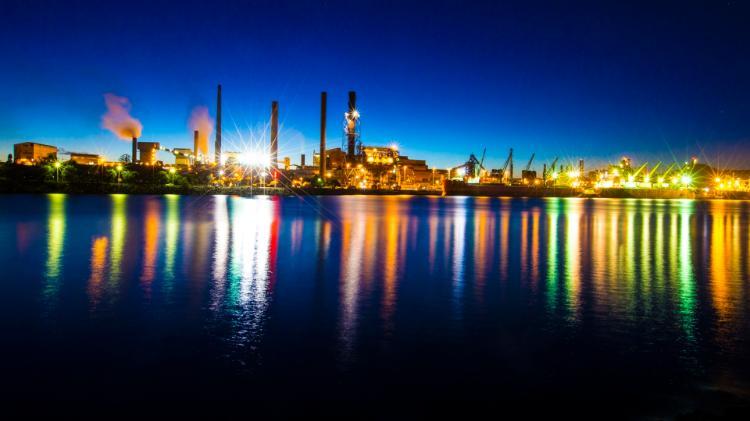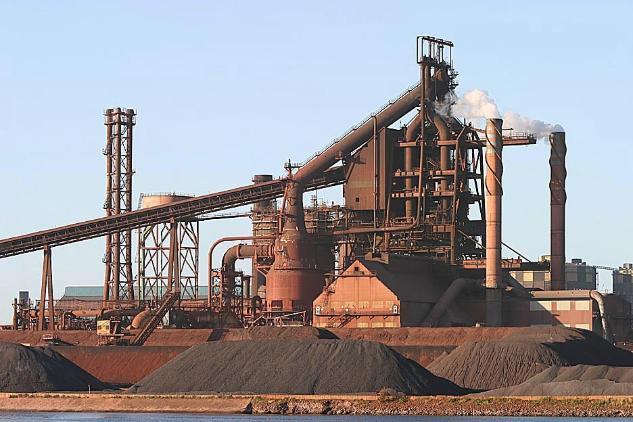New specific manufacturing processes and methodologies that significantly improve resource intensity and utilisation whilst maintaining productivity, quality, and asset life objectives.
Process Integration and Sustainability
Program Leaders
Academic: Brian Monaghan (UOW)
Industry: David Pinson (BlueScope), Mark Bubicich (Liberty)
This program targets a holistic approach to optimisation of resource intensity for steel manufacturing processes, constrained by productivity, asset life management, steel quality and sustainability objectives. Since raw materials and energy resources are closely intertwined, this holistic approach is required to help solve major strategic challenges currently faced by Australian steel manufacturing, which, due to relatively low production capacity, operates under considerable capital constraints.
The anticipated outcomes include new decision-informing methodologies designed to optimise manufacturing efficiency and asset life extension, novel ways to increase utilisation of by-products and end-of-life resource streams and new efficient recovery/separation of valuable mineral resources. These outcomes reduce the environmental impact through reducing primary raw materials consumption, landfill and hazards associated with stockpiling, and GHG emissions.
Program 1 is comprised of two sub-programs:
- Integrated & Efficient Steel Manufacturing
- Resource Intensity & Sustainability
Integrated & Efficient Steel Manufacturing

- 1.1.1- Fundamental understanding of processing limits in blast furnace ironmaking
- 1.1.3- Inclusion Engineering in Si de-oxidized steel for Rail Grade applications
- 1.1.5- Numerical investigation of temperature variations in blast furnace hearth sidewall and Taphole Refractories
- 1.1.6- Numerical investigation of temperature variations in LPS 2BF blast furnace hearth sidewall and taphole refractories
- 1.1.7- Sintering of contemporary raw materials blends for ironmaking
This is a collaborative project between ArcelorMittal, BlueScope Limited (BSL) and University of Wollongong (UOW).
The project commenced in the latter half of ARC Research Hub for Australian Steel Manufacturing and continued under the current Steel Research Hub. The project was designed to provide new fundamental information and provide ArcelorMittal and BlueScope a more comprehensive understanding of complex phase interactions which occur in the lower zone of the blast furnace (BF) i.e. between gas, solids, liquids and powder.
The selection of raw materials with properties that optimise the performance of each specific blast furnace, in terms of productivity and overall operating cost. This optimisation can be informed through understanding the processing limits in the BF lower zone, specifically through improved knowledge of key multiphase phenomena occurring in this zone.
Ultimately, the link between raw material properties with BF input and operational parameters, such as the pulverised coal rate, slag rate and coke strength, should make it possible to derive the most relevant, inherent relationships for “value-in-use” determinations made by steel companies.
Team: Dr Xuefeng Dong (UOW), Dr Apsara Jayasekara (UOW), Professor Brian Monaghan (UOW), Dominique Sert (ArcelorMittal), Dr Sheng Chew (BlueScope), Dr David Pinson (BlueScope), Dr Pascal Gardin (ArcelorMittal), Rodolfo Paulo Santos Ferreira (ArcelorMittal), Dr Paul Zulli (UOW).
Steelmaking at Liberty Primary Steel’s (LPS) Whyalla steelworks produces ~1.1 Mt p.a. of steel in the form of billets, blooms and slabs via a billet caster and a combination caster. The billet caster produces feed for the Rod Mill in Newcastle and for the Bar Mill in Sydney. The combination caster produces feed for the Whyalla Mill to be rolled into rails and structural sections. Any available capacity in excess of the Rod or Bar Mill requirements is exported as semi-finished products (billets or slabs).
In this research project, LPS is primarily interested in developing an understanding of the capability of the current Ladle Metallurgy Furnace-Tundish rail making process to meet the maximum Total Oxygen value of 35 ppm in the Australian rail standard AS1085.1:2019 and how the process can be improved.
Team: Professor Brian Monaghan (UOW), Junior Ngoyi Kayembe (UOW), Israel Murgas (Liberty Primary Steel), Dr Navjeet Singh (Liberty Primary Steel), Professor Akbar Rhamdhani (SUT)
The University of Wollongong (UOW) has joined forces with BlueScope Limited (BSL) to develop a project which focuses on investigation of blast furnace asset, specifically, the hearth sidewall and taphole refractories.
A unique challenge for BSL potentially affecting its steelmaking competitiveness and sustainability is the reliance on a single blast furnace (BF5) for the supply of liquid hot metal to downstream processes. Extending the life of capital-intensive assets like BF5 is a key focus and therefore, novel ways to significantly increase furnace operational security and campaign life are sought, especially around the tapholes.
Overall, this project provides greater fundamental and technological capability to assess refractory condition and hence, inform on alternate operational and engineering actions required for BF5’s life extension.
It is a project undertaken in partial collaboration with Liberty Primary Steel (Project 1.1.6).
Team: Dr Xuefeng Dong (UOW), Dr Habib Zughbi (BlueScope), Mark Biasutti (BlueScope), Dr Sheng Chew (BlueScope), Dr Paul Zulli (UOW)
The University of Wollongong (UOW) and Liberty Primary Steel (LPS) will come together on a project which aims to fully assess the condition of hearth sidewall and taphole refractories and evaluate the asset life of Liberty Primary Steel (LPS) Whyalla No. 2 Blast Furnace (WBF2).
It is a project undertaken in partial collaboration with BlueScope Limited (BSL) (Project 1.1.5).
The expected outcome of the project is the development and validation of an enhanced CFD model of LPS W2BF hearth. The model will be a tool that can be used to better understand and possibly mitigate conditions where high levels of sidewall temperatures are measured. This will in turn lead to more effective management of, and potentially help extending W2BF campaign life
Team: Dr Xuefeng Dong (UOW), Matthew Middleton (Liberty), William Cunningham (Liberty), Dr Paul Zulli (UOW)
This project is between the University of Wollongong (UOW), BlueScope Limited (BSL) and the University of Newcastle (UoN) and focuses on a critical area of ironmaking research.
The project will extend current understanding of the iron ore granulation process and propose a predictive framework capable of assessing ore blends, including the addition of ultrafine concentrates.
The key expected outcome of the project will be to develop a sound methodology for optimising the granulation process on a bed-by-bed basis within the operational constraints of BSL’s Sinter Plant, without recourse to addition of costly additives including burnt lime.
Team: Associate Professor Tom Honeyands (UON), Dr David Pinson (BlueScope), Dr Sheng Chew (BlueScope), Dr Tosin Aladejebi (UON)
Resource Intensity & Sustainability

- 1.2.1- By-products utilisation
- 1.2.2- Conversion of co-product/by-product streams into usable materials and valuable products
- 1.2.3- Characterisation and preparation of waste plastics for coke-making
- 1.2.4- Numerical Modelling of Fluid Flow Dynamics of an Electric Smelting Furnace
- 1.2.5 Transport infrastructure construction using steel furnace slag
One of the key objectives of the Steel Research Hub involves a commitment to the sustainability of the Australian steel industry, both from an economic and environmental perspective. In line with this shared commitment, BlueScope Limited (BSL), and the University of Wollongong (UOW) have developed a project which focuses on supporting the sustainable recovery of iron and flux units, and separation of zinc (Zn) from current production streams and material stockpiles.
The new collaborative project aims to support and augment BSL’s internal recycling program. The expected outcomes include detailed physical, chemical, and structural characterisation of targeted by-products recognising their inherent variability; analysis of their reaction and partitioning behaviour under simulated storage and process conditions, development of requirements and/or strategies to maximise recovery of iron and flux units, and separation of Zn-rich streams.
Team: Professor Brian Monaghan (UOW), Dr Andrew Lang (UOW), Dr David Pinson (BlueScope), Dr Sheng Chew (BlueScope), Dr Habib Zughbi (BlueScope), John Heslin (BlueScope)
This is a collaborative project between Swinburne University of Technology (SUT), Liberty Primary Steel (LPS), and the University of Wollongong (UOW). This project will review, explore and potentially drive the adoption of new processing technologies relating to the reuse of product materials.
This project aims to identify comprehensive pathways and circular economy opportunities for conversion of by-products from LPS’s Whyalla plant (and surrounding industries), supported by technical and economic analyses; determine products and/or processes for the consumption of by-product materials to eliminate the need to dispose of materials via landfill, and to provide an economic benefit to the business; and demonstrated utilisation of concentrated solar energy for selected process or production of new products to reduce the overall carbon footprint.
Team: Professor Akbar Rhamdhani (SUT), Israel Murgas (Liberty), Professor Brian Monaghan (UOW), Professor Geoff Brooks (SUT), PhD Candidate Made Giri Natha (SUT)
A combined BlueScope Limited (BSL) and University of Newcastle (UON) project, focused on characterising waste plastics available from a number of domestic sources and developing appropriate processing techniques to allow this material to be successfully used in domestic coke-making operations.
Overall, the team aims to provide a useful tool to set up blending strategies to include the waste plastics for the coke-making feed materials without compromising coke-making products (coke and by-products) and generating adverse environmental outcomes.
Team: Dr Soonho Lee (UON), Dr Peter Austin (BlueScope), Dr Epma Putri (BlueScope), Dr Arash Tahmasebi (UON), Dr Hannah Lomas (UON), PhD candidate Jangho Lee (UON)
This research is designed to initiate the development of a knowledge base for Electric Smelting Furnace technology, a process under consideration as part of a future, low emission steel production route. In this project, CFD models will be developed, representing a first step in building an overall understanding of the technical and operational strengths/weaknesses of the technology fo ironmaking. Initially, the intention is to better understand hot metal and slag inventory management and control.
Team: Dr Xuefeng Dong (UOW), Dr Sheng Chew (BSL), Dr Habib Zughbi (BSL), Dr David Pinson (BSL), Mark Biasutti (BSL), Dr Peter Austin (BSL), Dr Paul Zulli (UOW)
This is a PhD-based project developed in collaboration with the University of Wollongong (UOW) and Australian Steel Mill Services (ASMS).
In Australia, basic oxygen furnace slag (BOFS) or the steel furnace slag (SFS) produced from the steel-making process has limited applications compared to ground granulated blast furnace slag (GGBFS). Recently, SFS has been used as aggregate in asphalt pavement mixes; however, the inadequate knowledge and study on the relevant engineering and environmental properties of unbound SFS have been limited due to its potential to expansive properties when hydrated.
The project explores the potential of various engineering applications of utilising SFS integrating waste products from other industrial processes, with the aim to develop an alternative composite material for transport infrastructure construction based on the preliminary research work conducted at UOW.
Team: Associate Professor Vinod Jayan Sylaja (UOW), Gavin Tory (ASMS), Dr Pabasara Wanniarachchige (UOW), PhD Candidate Yeshwant Sunkara (UOW)
Image credits: Destination Wollongong